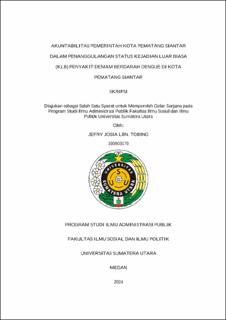Akuntabilitas Pemerintah Kota Pematang Siantar dalam Penanggulangan Status Kejadian Luar Biasa (KLB) Penyakit Demam Berdarah Dengue di Kota Pematang Siantar
Accountability of The Pematang Siantar City Government in Managing The Extraordinary Event Status (KLB) of Dengue Hemorrhagic Fever in The City of Pematang Siantar

Date
2024Author
Tobing, Jefry Josia Lbn
Advisor(s)
Trimurni, Februati
Metadata
Show full item recordAbstract
Dengue Fever (DHF) is a serious threat to public health in various regions, including in Pematang Siantar City. Researchers assess that the handling of this case is responsible for the Government through the Health Office. The government plays an important role in handling this dengue fever case, especially if it is at risk of determining the status of an Extraordinary Event (KLB). In addition, the government is also responsible for efforts to prevent, supervise, and overcome extraordinary events of this disease. This study aims to evaluate and analyze the level of government accountability in responding to extraordinary dengue events in Pematang Siantar City.
This research uses descriptive research methods with a qualitative approach, data collection techniques namely interviews, observation, and documentation. This research is located at the Medan City Health Office with research informants, namely: Communicable Disease Coordinator of P2PM Division, Surveillance Coordinator, Person in Charge of the Puskesmas DHF Program, and the community. The data and information collected were then analyzed based on six indicators used to measure the success and achievement of accountability, namely the Hulme and Turner accountability indicators (Raba, 2006: 15) which are expressed through Legitimacy, Moral Quality, Responsiveness, Transparency, Resource Utilization, and Effectiveness and Efficiency.
The results of this study indicate that the Pematang Siantar City Government through the Health Office has implemented good accountability and can be seen through the success in reducing the number of diseases and deaths caused by DHF during the outbreak. This is also supported by supporting factors that influence the success of the government in handling outbreak status, namely the existence of good governance, good human resources, and the allocation of funds / budget provided by the government which is quite adequate. Meanwhile, through this research, the author hopes that the Health Service's services and accountability for the dengue fever outbreak will be more consistent with routine health monitoring and education, as well as increasing health promotion through seminars or other movements using any media.
Collections
- Undergraduate Theses [1957]
